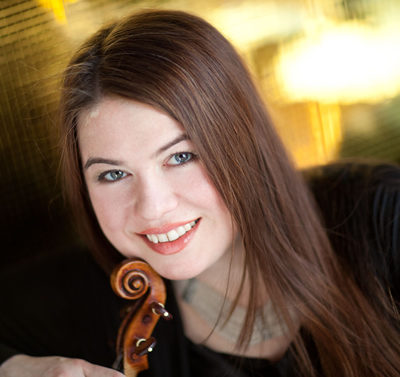The young violinist Lara St. John, known to many for her audacious self-presentation in her cover art, is now, as happens to all of us, not quite so young, and entering her maturity as a concerto soloist. She appeared with Grant Llewellyn and the North Carolina Symphony in an interestingly designed program (Llewellyn, in speaking to the audience, compared it to an Italian sandwich), with two major pieces by Tchaikovsky, both with Italian themes, surrounding four concertos.
Opening the program was “Francesca da Rimini,” Op. 32, of Peter Ilyich Tchaikovsky, a tone poem depicting the famous adulterous couple which we meet in Dante’s Inferno, Paolo and Francesca da Rimini, forever floating in a loving embrace (there is a wonderful image of them by Gustave Doré, and another, anonymous, adorns the title page of Tchaikovsky’s score). I can never listen to the unfailing invention of the music of Tchaikovsky without thinking of his excoriation of Brahms, because, truly, these geniuses are at opposite poles. Tchaikovsky was meant for the stage, for drama, for the heightened moment, not for music as a sort of methodical German science. This fantasia, as he names it, was full of the gripping and the theatrical in the fluid and able hands of Llewellyn and the NCS. There was a sweet solo clarinet interlude, full of romance, fluttering flutes (certainly intended to represent the winged souls in the afterlife) – in fact the work is quite a showpiece for the whole woodwind choir. And while perhaps the piece is not structured in the symphonic fashion, it combines its materials as to prepare for an exhilarating rush to a wonderfully noisy and crashing conclusion.
After this opening, the spicy meat in the Italian sandwich was played by much reduced forces with strings only (although a respectable number of these) with harpsichord continuo, for four “Seasons” – Vivaldi’s “Spring”, Piazzolla’s “Summer” and “Autumn”, and Vivaldi’s “Winter” (that leaves a matching set of the other four concerti for a future visit from St. John). The challenge for any soloist and any conductor venturing the Vivaldi Seasons is to bring something new and convincing to bear on what must certainly be among the most familiar, if not the most familiar, works in the repertoire. Although one might not expect it from her photos, St. John makes a tall, even Wagnerian impression on stage (think Brünnhilda), and her demeanour, in contrast, is active, nervous, almost neurotic, full of intense expression. Her tone, and the tone of the strings in general here, was quite straight, so that even if the NCS is not a period-instrument band, Llewellyn certainly has the sound in his ears, as does St. John. The rhythm was very free, something that was only more evident in the two concerti by Piazzolla, which not only are modeled on the Vivaldi, but quote from them in a sort of post-modern collage. Piazzolla, like Vivaldi, is so self-consistent as a composer that it always seems to me that each of his compositions is cut from the same cloth with the same gestures, the same harmonies, and St. John seemed perhaps even more at home in the extreme theatricality of the Buenos Aires tango than she did in Vivaldi. Closing the set of the Seasons was Vivaldi’s “Winter,” taking the frigid pictorialism of the work to the outer limits, and closing at a devilishly fast tempo. St. John was rewarded by a standing ovation and several bows. I can’t imagine she won’t be back soon!
Closing the evening was another sublimely busy and noisy work from Tchaikovsky, the well-known Capriccio Italien, Op. 45, this one especially showcasing the impressive work of the NCS brass, who opened the work in chorus. Llewellyn is always at the top of his game when his gestures seem simply to ride along the top of an orchestral sound that shows why the NCS is such a treasure. All in all, this is a program not to be missed, the latest in a series of gems from Llewellyn. If you weren’t there last night, scurry, don’t amble, and be sure to scoop up some of the remaining tickets for the other three performances this coming weekend.











